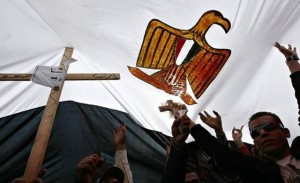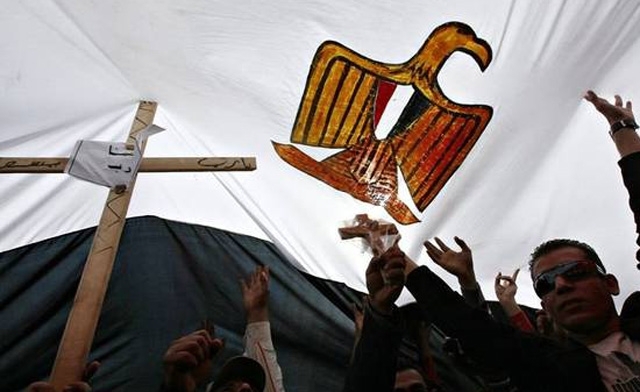
(AFP Photo)
The United States Department of State published its annual International Religious Freedom Report for 2012 on Monday. The section of the report regarding Egypt said that while the constitution includes provisions for freedom of religion, it also contains restrictions on these freedoms.
The report compiled by the Democracy, Human Rights and Labour Bureau of the State Department includes an 18-page section on Egypt discussing the status of religious freedoms in 2012. The report on Egypt is split into four sections: religious demography, status of government respect for religious freedom, status of societal respect for religious freedom, and US government policy.
The report highlights some of the major issues regarding freedom of religion in Egypt, such as sectarian divisions, recognition of religious minorities, the legal status of religion, anti-Semitism, and the government’s response to these issues.
The report starts by pointing out that Egypt’s new constitution, ratified in December 2012 does “provide for some freedom of religion”. However, it asserts that “certain constitutional provisions, laws and government policies and practices limit that freedom”. On the constitution itself the report states, “some provisions provide less protection than the previous constitution”. It also criticises the “ambiguous clause” that subjects the right to worship to regulation by the law. The report claims that the clause implies that religions not recognised by the government, such as Baha’i, “are precluded from applying their own religious laws and restricted from building places of worship”.
Concern was also raised over the interpretation of Articles 2 and 4 of the constitution designating that Islam is the official religion of the state and that the “principles of Sharia” are the primary source of legislation. The concern lies with the ambiguity of this statement, as some believe that Al-Azhar has “the authority to define and interpret Sharia”, while others believe the courts have this authority.
A sub-section entitled “Government Practices” noted that “the government failed to protect Christians and their property effectively when they were attacked in Dahshur, Alexandria and Rafah.” It added that the government “often failed to investigate and prosecute crimes against Christians and other religious minorities”, highlighting the Maspero massacre of October 2011. The report also said that in 2012 the government “continued to harass Shi’as and prohibit conversion from Islam”. The report did, however, add that some religious minority groups “reported a decline in government harassment”.
There are also concerns over blasphemy laws, which were enforced in Egypt during 2012, as with the case of atheist blogger Alber Saber. The report also noted that “courts sometimes sentenced Christians to prison terms that exceeded those given to Muslims accused of the same crime”.
On the status of societal respect for religious freedom the report said, “there were reports of societal abuse or discrimination based on religious affiliation, belief or practice.” Despite this, “lethal sectarian attacks decreased” in 2012.
The report also discussed anti-Semitism in Egypt and cited the Supreme Guide of the Muslim Brotherhood Mohamed Badie calling on “Muslims to unite and be willing to shed their own blood against ‘Jews [who] have only increased the corruption in the world’”. It also highlights an incident in October 2012 when President Mohamed Morsi said “Amen” during televised prayers in response to a prayer calling for the destruction of the Jewish people.
The report included a section entitled “Positive Developments in Respect for Religious Freedom”, which begins: “the government sometimes sent extra security forces to protect churches and prevent escalation of conflict”. It went on to point out that the government did provide extra security and compensation for victims of religious based violence. Also highlighted were incidents when perpetrators of religiously motivated crimes were punished, including the handing down of the death sentence to Amer Ashour, a police cadet who murdered a Copt and injured five others on a train in January 2011.
The report praised Morsi for holding two meetings with representatives of the Christian churches during the first months of his presidency, which was “something President Mubarak nor the Supreme Council of the Armed Forces had done in decades”.
The section on US policy stressed that the US is supporting initiatives to increase religious freedoms in Egypt. It also pointed out that embassy officials and former Secretary of State Hillary Clinton were in contact with the Egyptian side throughout 2012 to promote religious freedoms.


